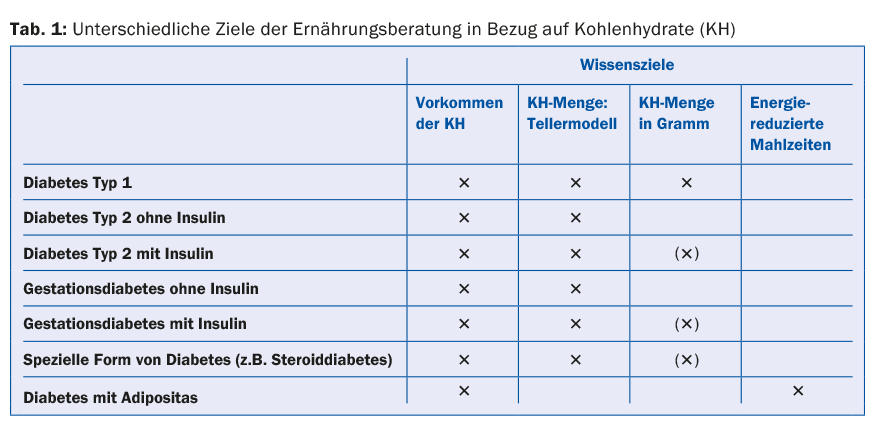The diagnosis of diabetes mellitus almost always means that patients have to change their diet. Mieke Jacobs, Bc Dietetics, nutritionist at the University Hospital Zurich, provided information on the most important nutrition principles in a lecture at the “Diabetes Update Refresher”. Patients should know which foods contain how many carbohydrates. Therefore, weighing food – at least for a certain period of time – is still useful to train the patient’s eye.
A healthy diet adapted to the disease is an important part of the necessary lifestyle adjustments for diabetics. To learn proper nutrition principles, patients usually go to nutrition counseling. This pursues various goals. Promote and support healthy eating to improve overall health. In particular, the focus is on ensuring that patients achieve and maintain individual blood glucose, blood pressure and lipid targets, as well as target weight, so that late complications can be avoided wherever possible. It is important that the nutritionist takes individual nutritional needs into account as much as possible and gives practical advice that is suitable for everyday use. Patients should keep the joy of eating – and, for example, also plan to enjoy sweets in moderation – and only restrict themselves where it is really necessary.
Special diet is not necessary
The American Diabetes Association’s guidelines provide recommendations on various subsets of nutrition [1,2]. Type 2 diabetics who are overweight are recommended to reduce their weight; this improves not only blood glucose levels, but also blood pressure and lipid levels, especially at the onset of diabetes.
“There is no such thing as an ideal nutrient ratio between carbohydrates, proteins and fats,” the speaker said. Therefore, no recommendations are made as to how the distribution of these macronutrients should be in the diet. With fat, for example, it is not the quantity but the quality that is decisive. Increasing the intake of omega-3 fatty acids makes sense.
Acceptable diets for diabetes management include the Mediterranean diet, DASH (Dietary Approaches to Stop Hypertension), low-fat, and low-carb. A diet that pays attention to the glycemic index can moderately improve glucose metabolism.
Weigh and estimate carbohydrates
The most important dietary components for diabetics are carbohydrates, as they cause the postprandial blood glucose level to rise the most. An ideal value for how many carbohydrates a diabetic should consume cannot be quantified, but it is important for diabetics to be able to estimate the carbohydrates contained in a meal. Mieke Jacobs advocated that individuals newly diagnosed with type 1 diabetes weigh carbohydrates for at least a period of time to train the eye and get a feel for “normal” portions (Table 1).

Diabetics should know which foods contain how many carbohydrates and how quickly they are digested. To train this knowledge, Jacobs works with different methods (plate model, carbohydrate exchange tables, diet plans, etc.). For example, sugar cubes can be used to visualize how many carbohydrates individual foods contain (three sugar cubes correspond to 10 g of carbohydrates). When the speaker showed the corresponding picture, the audience was also amazed: a banana is equivalent to six sugar cubes, an apple is equivalent to five and a roll made of white flour is even equivalent to nine sugar cubes.
Sucrose (household sugar) does not increase blood sugar more than other carbohydrates, but because of its caloric density, sucrose consumption should be limited. More and more diabetics are also using apps that help them estimate the carbohydrates and calorie content of a meal (e.g. “Carbs and Cals” or “Mysugr”).
Artificial sweeteners and light products help to reduce the intake of sugar and calories. A whole range of sweeteners are approved in Switzerland, but not all of them are used as table-top sweeteners.
Glycemic index
The glycemic index indicates in numbers which blood sugar-increasing effect a food has. The reference value (100) is the value of glucose. A food is tested in each case in the amount that contains 100 g of carbohydrates. For example, blood glucose levels rise rapidly after eating fruit juices, sorbets, cornflakes, white bread or mashed potatoes, and slowly after eating fondue, pizza or pasta. From the glycemic index, when the carbohydrate content of a food is taken into account, the glycemic load is obtained. However, both values are imprecise and subject to strong inter- and intraindividual variations. The rate of digestion, which in turn is influenced by numerous factors (Tab. 2), also plays an important role.

Using patient examples, the speaker explained how nutritional counseling is done in practice. This showed that both the amount of carbohydrate-containing foods and insulin requirements varied widely among patients.
Source: Diabetes Update Refresher, December 4, 2015, Zurich
Literature:
- American Diabetes Association: Foundations of Care: Education, Nutrition, Physical Activity, Smoking Cessation, Psychosocial Care, and Immunization. Diabetes Care 2015; 38: Supplement 1 S20-S30. doi: 10.2337/dc15-S007
- Evert AB, et al: Nutrition Therapy Recommendations for the Management of Adults With Diabetes. Diabetes Care 2014; 37: Supplement 1 S120-S143. doi: 10.2337/dc14-S120
HAUSARZT PRAXIS 2016; 11(3): 53-55











